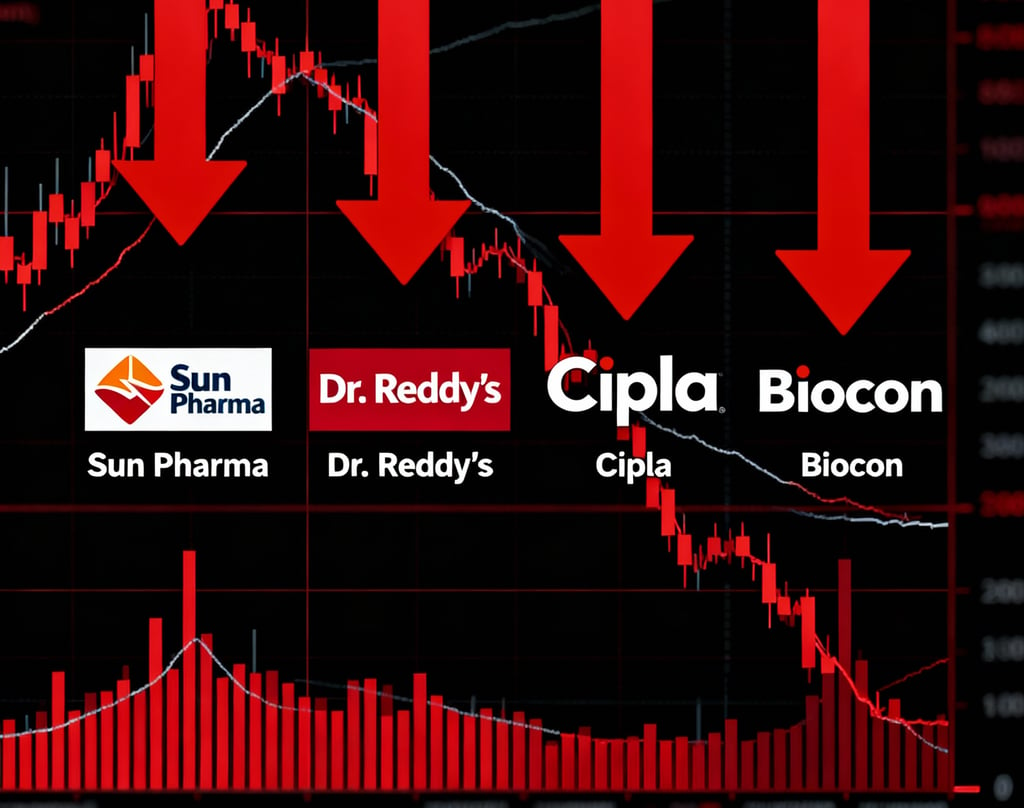Trump Announces 100% Tariffs on Branded Drugs
Indian pharmaceutical stocks fell by around 2.5% on September 26, 2025, after President Trump announced a 100% tariff on imported branded and patented drugs, effective October 1. Major firms like Sun Pharma, Dr. Reddy's, and Biocon saw stock declines of up to 5%, with the entire Nifty Pharma index trading in the red. While generics remain exempt for now, the move has created uncertainty for Indian exporters, who derive a significant share of their revenue from the US market.
MARKET NEWS
9/26/20252 min read


Following the announcement by U.S. President Donald Trump that all imported branded and patented medications would be subject to a 100% tariff starting on October 1, 2025, Indian pharmaceutical stocks had a significant decline on Friday, September 26. Leading firms like Sun Pharma, Dr. Reddy's, Cipla, Lupin, Biocon, and Aurobindo Pharma were among the most severely impacted by the move, which set off a selloff that affected the whole sector. In early trading, these companies saw declines of up to 5%.
Sector-Wide Decline
By mid-morning, the Nifty Pharma index had down more than 2.5 percent, and all 20 of its components were down. The worst losses were suffered by Sun Pharma, which fell over 5% to an annual low. Biocon, Zydus Lifesciences, Gland Pharma, Natco Pharma, and Lupin also had decreases of 2% to 4%. The wider market reacted badly as well, with pressure from tariff and export worries pushing down the Sensex and Nifty.
US Market Exposure
Almost one-third of India's pharmaceutical exports, mainly lower-cost generics, go to the US; in fiscal 2025, exports increased by 20% to nearly $10.5 billion. However, the new tariffs imposed by the Trump administration expressly target branded and patented medications, and the full tax will be imposed on companies that do not currently have or are not developing U.S. manufacturing units. Although generics are now excluded, researchers caution that there is still uncertainty surrounding how complicated generics and biosimilars will be classified in the future.
Industry Concerns & Outlook
Market analysts and industry experts warn that companies with strong exposure to the United States, especially those who depend on exporting biosimilars and specialty medications, may find the tariff shock to be significant. Exporters of generic medications might be less affected in the near run, but any increase in tariff coverage could cause supply chains and production to break down, which could result in shortages and a loss of market share. Certain businesses that have made investments or are currently building plants in the United States will be exempt, but those that continue to operate export-focused business models in India face uncertainty.
Policy Objectives
The goal of President Trump's tariff policy is to encourage domestic pharmaceutical production, thereby reducing reliance on imports of high-end, patent-protected medications. The administration defined "IS BUILDING" as any business that has started physical construction or site development, making it clear that exemptions are only granted to companies which are actively constructing facilities in the United States.
Market Reaction
All 20 components saw a 2.3% decline in the Nifty Pharma index, which was down 21,458.75 points.
Aurobindo Pharma fell 2.4%, Biocon 3.3%, Zydus Lifesciences 2.8%, Sun Pharma almost 5%, Dr. Reddy's Laboratories 2.3%, and Lupin and Cipla each fell roughly 2%.
Over one-third of India's pharmaceutical exports, primarily generics that are now tariff-exempt, are sent to the US.
Global supply chain players and domestic pharmaceutical companies are likely to be vigilant due to policy uncertainties.
